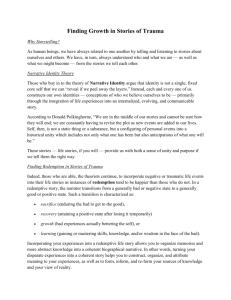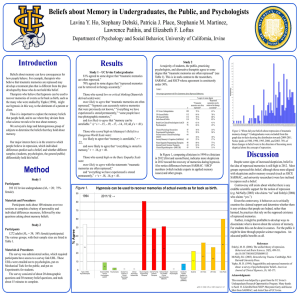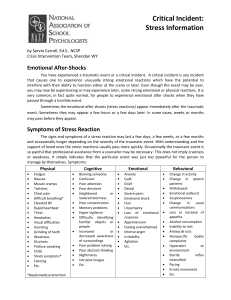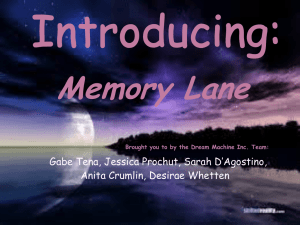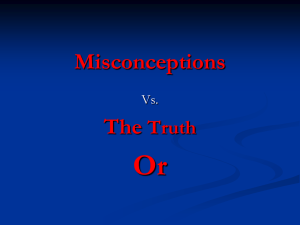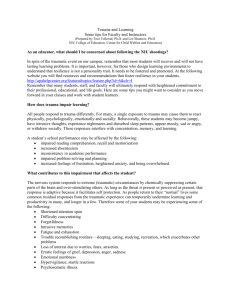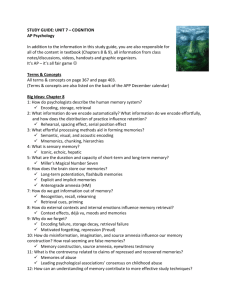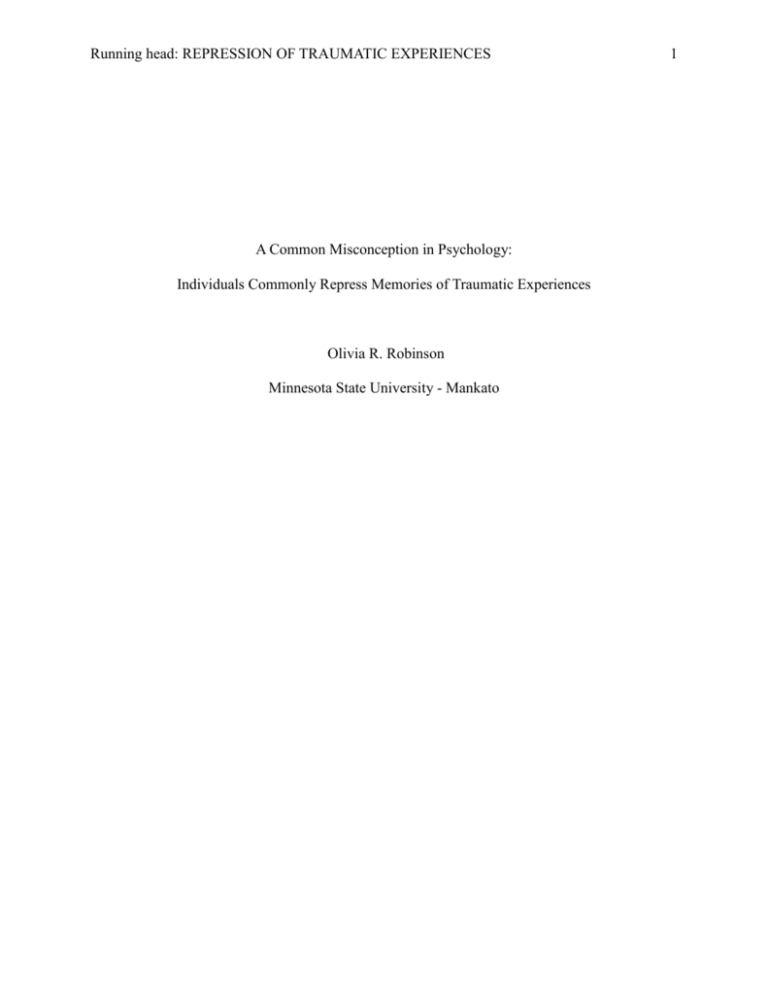
Running head: REPRESSION OF TRAUMATIC EXPERIENCES
A Common Misconception in Psychology:
Individuals Commonly Repress Memories of Traumatic Experiences
Olivia R. Robinson
Minnesota State University - Mankato
1
REPRESSION OF TRAUMATIC EXPERIENCES
2
A Common Misconception in Psychology:
Individuals Commonly Repress Memories of Traumatic Experiences
Psychology is defined as the study of the mind and behavior. In modern society, most
people would like to think that they know how their own mind works and why they act the way
they do, but often they do not. This is the birthplace of common misconceptions that exist in the
field of psychology, simply from people thinking they know more than they do. These ways of
knowing are a fundamental topic in psychology as they describe where we get the information
we believe to be true. These ways of knowing include authority, reason, intuition, and scientific
method (Myers). We naturally believe that information told to us by an authority figure is valid,
that our reason and intuition will never fail us, and that scientific method only produces accurate
results. However, these beliefs can be false when it comes to psychology. Most misconceptions
in psychology appear to be true because they have been passed down through many generations
and in some ways, have become part of our common knowledge. These misconceptions can
range anywhere from discussing how to take a test to what hypnosis truly is.
One common misconception in today’s society is that individuals commonly repress
traumatic experiences. While we may believe that this is true, we are incorrect in our thinking
which will be expanded upon in this paper. In order to understand why this myth is incorrect and
change our thinking to reflect the truth behind this misconception, we must learn how our mind
responds to traumatic experiences not only in the time of the experience but also the time
following the experience. This essay will provide information about why this misconception
regarding traumatic experiences and repression exists and how society can alter their thinking to
reflect correct information and psychological happenings. When accurate information is
REPRESSION OF TRAUMATIC EXPERIENCES
distributed to those who have misconceptualized trauma and repression, this misconception can
be successfully eliminated and society rely on factual knowledge instead of the common sense
they once relied on.
Consistency of the Misconception Over Time
The belief that individuals commonly repress memories of traumatic experiences is a
misconception that has been prominent in society since the early 1990s (Lilienfeld, 2014). One
of the over-arching reasons why this misconception has stayed consistent since that time is the
fact that it seems to be common sense, and it was believed and promoted to be true by Sigmund
Freud, an authority in the field of psychology (Richard, 2014). In the opinion of many people in
society, it makes sense to think that people would naturally repress, or forget, memories of the
worst experiences in their life. Obviously they are not pleasant experiences to think about, so
common sense would lead us to believe that individuals would indeed repress these memories.
Sigmund Freud believed in repression of trauma in the human mind, yet it has never been
scientifically proved to exist. This has not stopped its prevalence in society. Despite the natural
feeling that this misconception is common sense and the trust in the beliefs of those in authority
such as Sigmund Freud, the knowledge correction portion this paper will explain that it is, in
fact, the opposite.
History of the Misconception in Cinema1
The misconception, while created by Sigmund Freud’s theory and belief in repression,
was reinforced by both modern-day cinema and literature. One link in cinema to this
misconception was a movie titled Batman Returns in 1992 (Lilienfeld, 2014). At the beginning
of the film, the evil villain named the Penguin, also known as Oswald Cobblepot, is shown as a
deformed infant who was exiled by his family after killing their pet cat (Batman, 2014). In the
3
REPRESSION OF TRAUMATIC EXPERIENCES
4
minds of American society, this story was seen as a traumatic experience, and indeed it was for
Oswald. For some time, this memory was supposedly repressed until about thirty years later
when Oswald decided to become the Penguin and seek revenge on his high-society parents for
treating him as they did. This dramatic exaggeration of repressed memory was yet another
catalyst for this misconception. The prominence of the belief that individuals commonly repress
memories of traumatic experiences was continued the following year with the release of the
movie titled Dying to Remember in 1993 (Lilienfeld, 2014). This movie depicts a woman
struggling with nightmares of what appears to be a previously repressed memory of being
involved in a murder (Dying, 2014). The plot as well as the personal experiences of Lynn
Matthews, the main character, facilitated the growing belief in this misconception that her
memories were repressed, then brought back in her nightmares. Lastly, The Butterfly Effect, a
movie released in 2004, added more fuel to the fire behind the misconception that individuals
commonly repress memories of traumatic experiences (Lilienfeld, 2014). This movie describes
the life of Evan Treborn, a college student who experienced many traumas during his childhood,
including sexual abuse by his neighbor, domestic abuse by his father, and the murder of his
mother, father, and sister, which led to “stress-induced memory losses” (Butterfly, 2014). This
movie leads viewers, especially those who have not experienced extreme traumas such as those
of Evan, to believe that repression of these memories is indeed something that can occur. Over
time, as pop culture and the entertainment industry developed, the traumas of characters became
experiences that a larger portion of the population has experienced. While it is extremely
unlikely that a portion of the population has been exiled by their family because they killed the
pet cat, nearly 10% of the population, 30 million people, were sexually abused as a child (Child,
2014).
REPRESSION OF TRAUMATIC EXPERIENCES
5
History of the Misconception in Literature. Another way in which this misconception
was continually instilled into the minds of society was through Judy Blume, a popular author that
featured repression in her book titled Wifey. This book describes the life of Sandy Pressman, a
middle-aged woman who seemed to repress memories of her sexuality and her personal sexual
experiences as a teenager and into her emerging adulthood, the period of time between being a
teenager and being a fully-independent and self-sufficient adult. This situation of supposed
repression of memories is slightly different than the movies discussed in the previous paragraph
though as Susan’s memories were not necessarily traumatic. Her memories were described more
as a time of questioning and exploration, something common in the teenage years in regards to
sexuality. After these memories are re-introducing into her life as a mid-aged woman, she was
reminded of her personal sexual needs as well as the fact that her marriage of many years was
failing her in the fulfillment of these needs. Her realizations affect many of her decisions in the
book as well as facilitate her realization that her husband is having the same exact issues. While
this fictional situation is not exactly the same as the other fictional situations in regards to
traumatic experiences, it still shows a case of repression of memories that only emphasized the
misconception in society that individuals commonly repress memories of traumatic experiences.
Misconception Knowledge Correction. The majority of society holds the belief that
individuals commonly repress memories of traumatic experiences, but this belief is incorrect.
Repression of traumatic experiences has been identified as one of the greatest misconceptions in
psychology as it is widely believed to be true. The first way to prove that this concept is not valid
is to inform society on the fact that often times, our ways of knowing can be flawed and provide
us with inaccurate information that we then believe to be true. Authority is one way of knowing
that has helped this misconception take root. Sigmund Freud believed in repression, yet his
REPRESSION OF TRAUMATIC EXPERIENCES
6
theories were never scientifically proved with the scientific method, another way of knowing
(Richcard, 2014). Because most people in society also believe that Sigmund Freud is the
founding father of psychology and knows all there is to know about psychology, which is also
incorrect, so they naturally believe what he says to be the truth (Richcard, 2014). Freud was a
driving force behind the start of this misconception, mostly because of the fact that he had
authority in his favor. One of the other ways of knowing that is directly associated with this
misconception is intuition, also known as common sense, hunch, and insight. Unfortunately, in
this case, our personal intuition fails us as individuals do not commonly repress memories of
traumatic experiences. In fact, traumatic experiences often become vivid and haunting memories
that victims desperately would like to forget, yet cannot. This is where one can see that the truth
is essentially the opposite of what the majority of society believes to be true. Individuals do not
commonly repress memories of traumatic experiences; they often become haunted by the vivid
memories of these traumatic experiences. These victims must learn to deal with these memories
as they continue on with the rest of their lives and for those who have not experienced a
traumatic event, it is truly something to be grateful for.
REPRESSION OF TRAUMATIC EXPERIENCES
7
References
Batman Returns. (n.d.) Retrieved October 29, 2014. www.imdb.com
Child Sexual Abuse Statistics. (n.d.). Retrieved October 29, 2014.
Dying to Remember. (n.d.) Retrieved October 29, 2014. www.imdb.com
Elin, M. R. (2004). The role of trauma, memory, neurobiology, and the self in the formation of
personality disorders John Wiley & Sons Inc, Hoboken, NJ.
Lilienfeld, S. (2010). Individuals Commonly Repress Memories of Traumatic Experiences. In50
Great Myths of Popular Psychology: Shattering Widespread Misconceptions about
Human Behavior (1st ed.). Chichester, West Sussex: Wiley-Blackwell.
Loftus, E. F. (1993). The reality of repressed memories. American Psychologist, 48(5), 518-537.
Myers, D. (2005). Exploring Psychology (9th ed.). New York, NY: Worth.
Pope, Harrison G,Jr, M.D., & Hudson, J. I., M.D. (1995). Can individuals "repress" memories of
childhood sexual abuse? an examination of the evidence. Psychiatric Annals, 25(12),
715-719.
The Butterfly Effect. (n.d.). Retrieved October 29, 2014. www.imdb.com
Richcard, R. (2014, January 1). Repressed Memories. A Guide to Psychology and its Practice,
n.e. Retrieved October 29, 2014.

